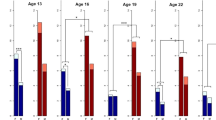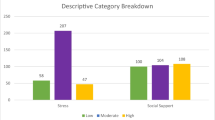Abstract
Studies of college freshmen find that men are more sexist in their attitudes than women. Does this hold also for high school students? This paper reports the relationship of (1) sex-role attitudes to selected school and family characteristics and (2) attitudes toward family life to sex-role conceptions for women and men. The study is based on 529 students in grades 9 to 12 attending four high schools. The findings show that males are more sexist than females and Blacks more so than Whites. Women who are bright, from upper class backgrounds, and whose mothers work are more equalitarian in sex-role conceptions. For men, family background is unimportant, but attending an elite public school seems to foster equalitarian sex-role conceptions. Men's sex-role attitudes are harder to explain than women's, and, unlike women, their role attitudes have little connection to their family orientation.
Similar content being viewed by others
References
Angrist, S. S., and Almquist, E. M. (1975).Careers and Contingencies: How College Women Juggle with Gender, Dunellen-Kennikat Press, New York.
Bayer, A. (1975). Sexist students in American colleges: A descriptive note.J. Marriage Family 37: 391–397.
Bem, S. L. (1975). Beyond androgyny: Some presumptuous prescriptions for a liberated sexual identity. Presented at the APA-NIMH Conference on the Research Needs of Women, Madison, Wisconsin.
Dunn, M. S. (1960). Marriage role expectations of adolescents.Marr. Fam. Living 22: 99–104.
Hill, R., and Aldous, J. (1969). Socialization for marriage and parenthood. In Goslin, D. A. (ed.),Handbook of Socialization Theory and Research, Rand-McNally, Chicago, pp. 885–950.
Hoffman, L. W. (1963). Parental power relations and the division of household tasks. In Nye, F. I., and Hoffman, L. W. (eds.),The Employed Mother in America. Rand-McNally, Chicago, pp. 215–230.
Keller, S. (1974). Components of male and female roles: Some theoretical comments. Presented at the American Sociological Association meeting, Montreal.
Komarovsky, M. (1973). Some problems in role analysis.Am. Sociol. Rev. 38: 649–662.
Lipman-Blumen, J. (1972). How ideology shapes women's lives.Sci. Am. 226: 33–42.
Osmond, M. W., and Martin, P. Y. (1975). Sex and sexism: A comparison of male and female sex-role attitudes.J. Marr. Fam. 37: 744–758.
Author information
Authors and Affiliations
Additional information
This work was made possible by a grant from the Buhl Foundation.
Research interests include women's career development, evaluation of social programs, and social indicators for urban services.
Has been involved in research on curriculum evaluation, sex roles, and voting behavior.
Research interests are curriculum development, research on testing, and history of school reform.
Rights and permissions
About this article
Cite this article
Angrist, S.S., Mickelsen, R. & Penna, A.N. Sex differences in sex-role conceptions and family orientation of high school students. J Youth Adolescence 6, 179–186 (1977). https://doi.org/10.1007/BF02139083
Received:
Issue Date:
DOI: https://doi.org/10.1007/BF02139083




